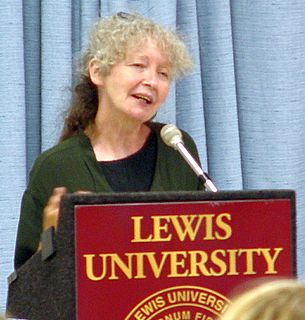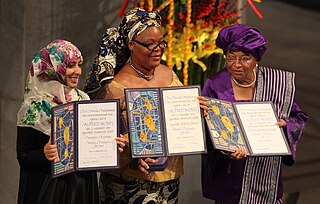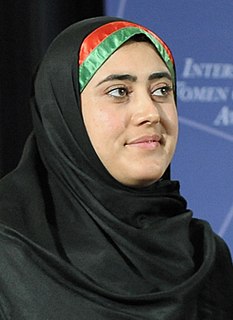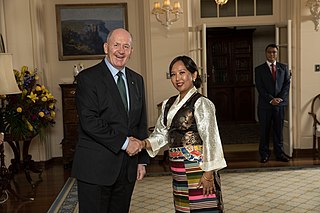Related Research Articles

Dr. Massouda Jalal is the first woman in the history of Afghanistan who ran for the Office of the President of Afghanistan in 2002, and again in 2004. She holds the distinction of being the first woman to compete for Presidency in Afghanistan, a highly conservative society where women’s engagement in public life was considered improper, unacceptable, and previously banned. Dr. Jalal emerged as a leading voice of Afghan women in 2001 after her election as the Representative to the 2002 Loya Jirga. While serving her term, she became one of the frontrunners for the position of Interim President, opposite to ex-president Hamid Karzai.

Kathy Kelly is an American peace activist, pacifist and author, one of the founding members of Voices in the Wilderness, and, until the campaign closed in 2020, a co-coordinator of Voices for Creative Nonviolence. As part of peace team work in several countries, she has traveled to Iraq twenty-six times, notably remaining in combat zones during the early days of both US–Iraq wars.

The roles of women in the Arab world have changed throughout history, as the culture and society in which they live has undergone significant transformations. Historically, as well as presently, the situation of women differs greatly between Arabic speaking regions, their urban or rural population and age groups. Among other factors, these differences can be attributed to local traditions, culture and religion, women's social or legal status, their level of education, health or self-awareness. Since the 19th century, and notably through the influence of the colonization in North Africa, the Arab Renaissance in Egypt, Lebanon, and Syria, and the end of the Ottoman Empire, the social and economic changes in the Arab world have become greatly accelerated and diversified.

Dr. Noeleen Heyzer is a Singaporean social scientist who was Under-Secretary-General of the United Nations and Executive Secretary of the United Nations Economic and Social Commission for Asia and the Pacific (ESCAP). She was the first woman to hold the latter position since ESCAP's founding in 1947. She is currently Lee Kong Chian Distinguished Fellow at the SMU School of Social Sciences. She was also the United Nations Secretary-General’s Special Adviser for Timor-Leste, working to support peace-building, state-building, and sustainable development. In 2005, she was nominated for the Nobel Peace Prize in recognition of her struggle to improve the lives of women, while always promoting peace and justice.

The Institute for Economics and Peace (IEP), chaired by technology entrepreneur Steve Killelea founder of IR, is a global think tank headquartered in Sydney, Australia with branches in New York City, Mexico City and Oxford. IEP develops conceptual frameworks to define peacefulness, providing metrics for measurement, uncovering the relationship between peace, business, and prosperity, and seeking to promote understanding of the cultural, economic, and political factors that drive peacefulness. IEP works in partnership with the Aspen Institute, Economists for Peace and Security the United Nations Global Compact, Center for Strategic and International Studies and Cranfield University. It also collaborates with the Organisation for Economic Co-operation and Development, the Commonwealth Secretariat, UNDP and UN Peacebuilding Support Office.

Tawakkol Abdel-Salam Khalid Karman is a Yemeni Nobel Laureate, journalist, politician, and human rights activist. She leads the group "Women Journalists Without Chains," which she co-founded in 2005. She became the international public face of the 2011 Yemeni uprising that is part of the Arab Spring uprisings. In 2011, she was reportedly called the "Iron Woman" and "Mother of the Revolution" by some Yemenis. She is a co-recipient of the 2011 Nobel Peace Prize, becoming the first Yemeni, the first Arab woman, and the second Muslim woman to win a Nobel Prize.

The 2011 Nobel Peace Prize was jointly awarded to three female political activists. Two African and one Asian female were awarded for their persistence in obtaining equal rights for women.

Malala Yousafzai, often referred to mononymously as Malala, is a Pakistani activist for female education and a Nobel Peace Prize laureate. She is also the world's youngest Nobel Prize laureate, and second Pakistani. She is known for human rights advocacy, especially the education of women and children in her native Swat Valley in Khyber Pakhtunkhwa, northwest Pakistan, where the Tehrik-i-Taliban Pakistan had at times banned girls from attending school. Her advocacy has grown into an international movement, and according to former Pakistani Prime Minister Shahid Khaqan Abbasi, she has become the country's "most prominent citizen".

Sanam Naraghi Anderlini is a British-Iranian author and Founder and Executive Director of the International Civil Society Action Network (ICAN). She has been a peace strategist working on conflicts, crises and violent extremism and as a consultant to the United Nations on the subject of women and conflict. Naraghi Anderlini joined LSE as Director of the Centre for Women, Peace and Security in December 2019.

Thomson Reuters Foundation is a London-based charitable arm of Thomson Reuters, a Canadian news conglomerate. The Foundation is registered as a charity in the United States and United Kingdom and is headquartered in Canary Wharf, London.

Jansila Majeed is an activist in Sri Lanka's Puttalam District. She is the Managing Trustee of the Community Trust Fund in Puttalam, which is an NGO which promotes minority rights and women's rights.

Maryam Durani is an Afghan activist and women's advocate. In 2012 she received the International Women of Courage Award.

Farkhunda Zahra Naderi is an Afghan politician and women's right activist. She is a member of the Afghanistan's High Council for National Reconciliation (HCNR) chaired by Abdullah Abdullah. Previously she served as a senior advisor to president Ashraf Ghani in United Nations Affairs. Before that she served as a member of Parliament, where she was elected as an MP in the 2010 Afghan Parliamentary Election.

Alaa Murabit is a Libyan-Canadian physician, Meritorious Service Cross recipient, one of 17 Global Sustainable Development Goals Advocates appointed by the Secretary-General of the United Nations, and a UN High-Level Commissioner on Health Employment and Economic growth. In 2019 Murabit was selected as one of the Top 20 of the World's 100 Most Influential People in Gender Policy alongside Ruth Bader Ginsburg, Melinda Gates, and Michelle Obama. Murabit is the co-founder of The Omnis Institute, an independent non-profit organization that aims to work on critical global issues through the empowerment of emerging local leaders. She previously founded and spearheaded Voice of Libyan Women at the age of 21.
N-Peace, or ‘Engage for Equality, Access, Community and Empowerment’ is a UNDP flagship initiative founded in 2010 to commemorate a decade of UNSCR 1325 implementation via the Women, Peace and Security (WPS) agenda.

Ms. Lucky Sherpa a well-known social activist of Nepal, a former Nepali ambassador for Australia and New Zealand is the first indigenous women and first Himalayan communities to be appointed as an ambassador by Nepal Government.
Masuada Karokhi is an Afghan peace activist, women's rights advocate, and recipient of the N-Peace Award in 2013. Karokhi ran for the office of member of parliament for Herat twice, in 2005 and 2010. She won in 2010.
Amina Azimi is an advocate for disabled women's rights in Afghanistan. In 2012 she won the N-Peace Award.
Rupika Damayanthi De Silva is a Sri Lankan peace and women's rights activist. She is the founder of the non-governmental organization Saviya Development Foundation which supports peace building, and women and children's rights. She has worked to unify Sinhala women in the north part of the Philippines with Tamil women in the south. In 2004 De Silva worked to help women affected by the Indian Ocean earthquake and tsunami.

Hasina Jalal is an advocate for women's rights and democracy in Afghanistan. In 2014, Jalal was elected by public vote to receive the "N-Peace Award" from the UNDP Asia Pacific Regional Office and the UN Secretary General's Special Advisor on the University for Peace.
References
- ↑ "Women are key to building peace in Afghanistan". UNDP in Asia and the Pacific. Retrieved 11 October 2020.
- ↑ "A Seat at the Table: The Evolving Role of Afghan Women Peacebuilders". Peacebuilding. Retrieved 11 October 2020.
- ↑ "Quhramaana Kakar". London School of Economics and Political Science. Retrieved 11 October 2020.
- ↑ "Team". Women for Peace and Participation. 19 March 2016. Retrieved 11 October 2020.
- ↑ "Afghan parliamentarian & peace activist achieve N-Peace Award". The Khaama Press News Agency. 9 October 2012. Retrieved 11 October 2020.
- ↑ "Asian women peace activists honored for their work in the frontlines of conflict". UNDP. Retrieved 11 October 2020.
- ↑ "Women building peace: Quhramaana Kakar". GAPS UK. 8 March 2018. Retrieved 11 October 2020.
- ↑ "Want to see peace in Afghanistan? Make sure women are included". openDemocracy. Retrieved 11 October 2020.
- ↑ "Why are women mediators still not recognised?". Thomson Reuters Foundation. Retrieved 11 October 2020.
- ↑ Halaimzai, Sahar; Halaimzai, Zarlasht; Kakar, Quhramaana; Sidiqi, Rahela. "Opinion | The U.S. is talking with the Taliban — over the heads of the Afghan people". Washington Post. Retrieved 11 October 2020.
- ↑ "Quhramaana Kakar". Conciliation Resources. Retrieved 11 October 2020.